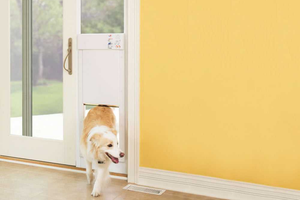Do You Fit the Bill?
9 Guidelines for Being a Responsible Pet Owner

Happy February, pet owners!
February has been dubbed “Responsible Pet Owners Month”. Owning a pet is a privilege, and the relationship should always be of mutual benefit to you and your furry friend. As a pet owner, there are certain duties that you must fulfill. Here at PetDoors.com, we wanted to give you a few guidelines for responsible dog ownership:
1. When making the choice to get a pet, be sure to choose a cat or dog breed that is ideal for your home and lifestyle. Some breeds are more family-oriented, while some are more protective of a single owner.
2. Be prepared to commit to the relationship for the entire life of your pet. There will be times when you become frustrated, or bothered by your pet. Oftentimes they do not mean to cause trouble. Use these instances as teachable learning moments to bring you and your pet closer together.
3. Understand the time and money that comes with being a pet owner. Your pet will need food, shelter, and many more supplies, just like you do for necessities of life! Do not neglect the needs of your pet. Cater to the needs of your pet as you would for your child or for yourself.
4. Create and maintain a veterinarian-client-patient relationship early for your pet care, and make use of this connection often. Being proactive in health care and in preventing potential illnesses in your pet is a much better and cheaper option than attempting to remedy a sick pet. Keep your pet’s veterinarian aware of their status, reporting any changes or abnormalities as you notice them and maintain regular check ups.
5. Feed your pet a nutritious, well-balanced diet. This will ultimately boost your pet’s immune system. Knowing how to take care of your pets and their nutrition is vital to a vibrant, healthy, and long life.

6. Just like a human, staying healthy takes more than just a good diet. You need to incorporate exercise and mental stimulation into your pet’s routine. This will keep your pet in shape as well as keep them happy and overall help their wellbeing. Some things to consider when deciding on activities for your pet are their age, breed, and health status.
7. Properly training and allowing for pet-to-pet socialization is one of the basic necessities when having a pet. Appropriate training will go a long way to ensure their safety, as well as that of other animals and people. Many pets end up in shelters due to behavioral issues that stem from a lack of connection with unknown animals and people. Socializing beforehand can serve as a barrier to future issues.
8. Ensure that your pet is identified properly via tags or microchips, in order to be prepared for an unexpected separation from your loved one.
9. Respect your pet's personal space and freedom just as you would with the rest of your family members. This can be hard for some pet parents, as we constantly worry about our pets. However, ensuring that they have a safe space to relax and run around is vital to their mental health! Consider giving them 24-hour access to the yard with a pet door.
The decision to take in a pet is a major one. There are many factors that must be considered before taking on this responsibility. These guidelines on responsible pet ownership are certain to help you transition in your role as a new pet owner or to supplement the wisdom you’ve gained in the time you’ve already owned your pet. For additional resources on dog responsibility, refer to the blogs listed below.
Best Ways to Keep Your Pet Safe From Harm




